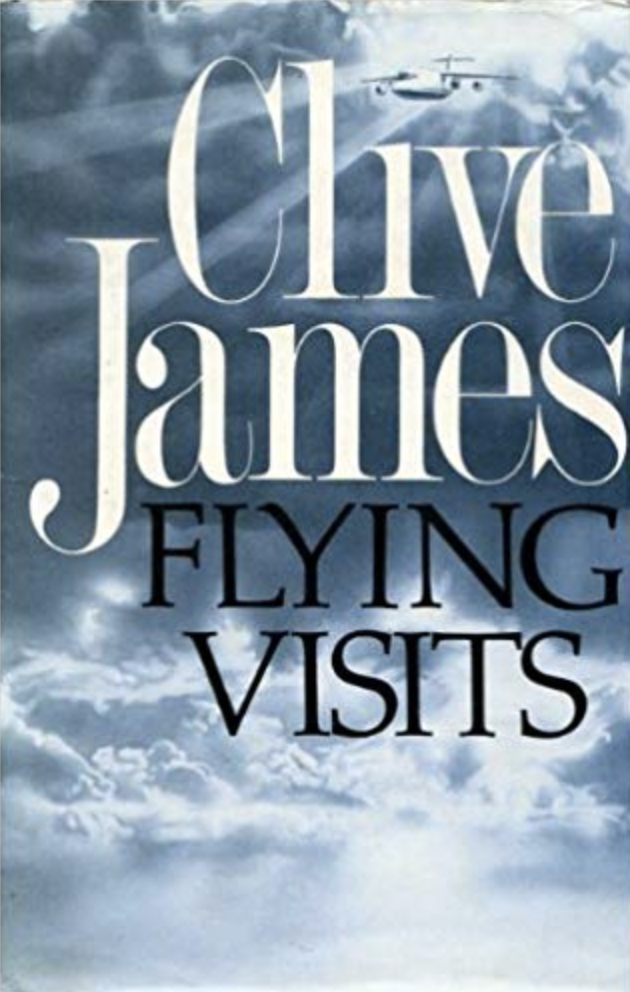Flying Visits
|
Published by Jonathan Cape 1984
Postcards from the Observer 1976-83. "There is a bad kind of travel writer who complains that the airport he leaves from herds him like a sheep, that the airliner he travels on feeds and lulls him like a veal calf, and that the airport he arrives at herds him like a sheep all over again, with the additional insult of somehow concealing all the allegedly exotic wonders that would have been revealed to him had he been allowed to make landfall by sampan or on the back of a camel. To complain that modern travel has become a cliché is a cliché in itself. It is also an especially conceited brand of romanticism, by which you imagine yourself in the curled shoes and flowing robes of Sir Richard Burton or T. E. Lawrence. Such adventures were already beyond recapture when they were first heard about, since new ground can be broken only once. Anyway, in this as in any other field, reality should be romance enough. I like airports and airliners. Nor is this a case of frankly admitting to myself, as with my fond feelings for television, an enthusiasm that was always there but masked by intellectual snobbery. There was never any hope of generating enough intellectual snobbery to cover up my keenness for the airways." From the Introduction |
Extract
British Airways were justifiably proud of getting your correspondent to Rome only three hours behind schedule. After all, Heathrow had been in the grip of those freak snow conditions which traditionally leave Britain stunned with surprise.
In England, British Rail loudspeakers had been smugly announcing prolonged delays due to locomotives coming into contact with inexplicable meteorological phenomena, such as heaps of water lying around in frozen form. Airport officials were equally flabbergasted to discover more of the same stuff falling out of the sky. But now my staunch Trident was leaving all that behind. In a dark but clear midnight, Rome lay below. Those strings of lights were roads all leading to the same place.
All my previous visits to the Eternal City had been done on the cheap. In those days I was still travelling on the weird escape routes frequented by students. Some of the students turned out to be eighty-year-old Calabrain peasant ladies carrying string bags full of onions. The charter aircraft belonged to semi-scheduled airlines whose pilots wore black eyepatches and First World War medals. Their point of arrival was Ciampino, Rome's number 2 airport—an inglorious military establishment ringed with flat-tyres DC-4s and Convair 240s too obsolete for anything except fire drill.
I used to live in the kind of cold-water pensione on the Via del Corso where the original rooms had been partitioned not only vertically but horizontally as well, so that the spiral staircase beside your bed led up to a bare ceiling. You had to apply in writing to take a bath. Lunch was half a plate of pasta on the other side of the Tiber. Dinner was the other half.
In England, British Rail loudspeakers had been smugly announcing prolonged delays due to locomotives coming into contact with inexplicable meteorological phenomena, such as heaps of water lying around in frozen form. Airport officials were equally flabbergasted to discover more of the same stuff falling out of the sky. But now my staunch Trident was leaving all that behind. In a dark but clear midnight, Rome lay below. Those strings of lights were roads all leading to the same place.
All my previous visits to the Eternal City had been done on the cheap. In those days I was still travelling on the weird escape routes frequented by students. Some of the students turned out to be eighty-year-old Calabrain peasant ladies carrying string bags full of onions. The charter aircraft belonged to semi-scheduled airlines whose pilots wore black eyepatches and First World War medals. Their point of arrival was Ciampino, Rome's number 2 airport—an inglorious military establishment ringed with flat-tyres DC-4s and Convair 240s too obsolete for anything except fire drill.
I used to live in the kind of cold-water pensione on the Via del Corso where the original rooms had been partitioned not only vertically but horizontally as well, so that the spiral staircase beside your bed led up to a bare ceiling. You had to apply in writing to take a bath. Lunch was half a plate of pasta on the other side of the Tiber. Dinner was the other half.
Contents
|
Author's Note
Introduction Postcard from Sydney 1. Home, James 2. Here is the Noos Postcard from Russia Postcard from New York Postcard from Japan 1. An Exchange of Views 2. The Bridegroom of the Sea Postcard from Biarritz |
Postcard from Rome
Postcard from Los Angeles 1. No Stopping Any Time 2. Even with Uncle's Dogs Postcard from Salzburg Postcard from Paris Postcard from Washington Mrs T. in China 1. The Dragon Lady Flies East 2. The Great Leap Homeward |
Postcard from Epcot
Postcard from Munich Postcard from Jerusalem |
